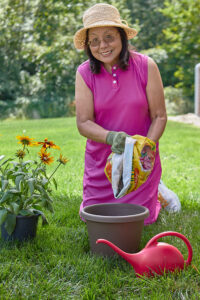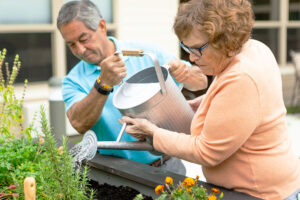There is nothing like stepping outside on a cool, sunny morning and taking in a few deep breaths of fresh air. From the cold bite of a crisp winter day to the heat and humidity of the dog days of summer, there is just something about being outdoors that invigorates the senses and uplifts the spirit. For seniors, the benefits of spending time outdoors are particularly profound, impacting physical health, mental well-being, and emotional stability. Here, we elaborate on the many health benefits of enjoying the outdoors for seniors.
Physical Health Benefits
Increased Physical Activity
Being outdoors encourages movement and physical activity. Whether it’s a leisurely stroll in the park, a hike on a nature trail, or participating in outdoor fitness classes, these activities help seniors stay active, maintain mobility, and improve overall physical fitness.

Improved Cardiovascular Health
Spending time outdoors often involves physical activities such as walking, gardening, or light exercise. These activities can improve cardiovascular health by increasing heart rate, improving circulation, and reducing blood pressure. Regular physical activity is crucial for maintaining heart health and reducing the risk of heart disease.
Enhanced Immune Function
Exposure to fresh air and natural sunlight can boost the immune system. Sunlight helps the body produce vitamin D, which is essential for bone health and immune function. Adequate vitamin D levels can help protect against infections and chronic diseases.
Better Respiratory Health
Breathing in fresh air can improve respiratory function. Outdoor air is generally cleaner and less polluted than indoor air, which can be beneficial for seniors with respiratory conditions such as asthma or chronic obstructive pulmonary disease (COPD).
Mental Health Benefits
Reduced Stress and Anxiety
Nature has a calming effect on the mind. Spending time outdoors can reduce stress and anxiety levels by promoting relaxation and providing a break from the hustle and bustle of daily life. The sights and sounds of nature, such as birds chirping or leaves rustling, can have a soothing effect on the mind.
Improved Mood and Emotional Well-being
Exposure to natural light and fresh air can improve mood and emotional well-being. Sunlight increases the production of serotonin, a hormone that regulates mood and promotes feelings of happiness and well-being. This can be particularly beneficial for seniors who may be prone to depression or seasonal affective disorder (SAD).

Enhanced Cognitive Function
Outdoor activities that engage the mind, such as bird watching, gardening, or exploring new trails, can help improve cognitive function. These activities stimulate the brain, enhance memory, and promote mental sharpness. Regular exposure to nature has been linked to a lower risk of cognitive decline and dementia.
Mindfulness and Relaxation
Being in nature encourages mindfulness and relaxation. Seniors can practice mindfulness by focusing on the present moment and appreciating the beauty of their surroundings. This can help reduce negative thoughts and promote a sense of peace and tranquility.
Social and Emotional Benefits
Social Interaction
Outdoor activities provide opportunities for social interaction and community engagement. Seniors can join walking groups, participate in community gardening projects, or attend outdoor events and festivals. These social interactions can reduce feelings of loneliness and isolation, fostering a sense of belonging and community.

Emotional Resilience
Spending time outdoors can enhance emotional resilience by providing a sense of connection to the natural world. Nature can offer solace and comfort during difficult times, helping seniors cope with stress, grief, or loss. The beauty and tranquility of natural settings can provide a sense of hope and renewal.
Sense of Accomplishment
Engaging in outdoor activities can provide a sense of accomplishment and purpose. Whether it’s completing a hike, growing a garden, or participating in a community clean-up, these activities can boost self-esteem and provide a sense of achievement.
Connection to Nature
Developing a connection to nature can enhance overall well-being. Seniors who spend time outdoors often develop a greater appreciation for the environment and a sense of stewardship for natural spaces. This connection can provide a sense of fulfillment and purpose.
Practical Tips for Enjoying the Outdoors
To maximize the health benefits of the outdoors, seniors should consider the following practical tips:
1. Dress Appropriately: Wear weather-appropriate clothing and comfortable footwear. Layering can help regulate body temperature, and protective gear such as hats and sunscreen can prevent sunburn.
2. Stay Hydrated: Bring water and stay hydrated anytime of the year, especially during hot weather. Dehydration can be a risk for seniors, so it’s important to drink plenty of fluids.

3. Choose Safe and Accessible Locations: Select outdoor locations that are safe and accessible. Parks with well-maintained paths, benches, and restrooms can provide a comfortable environment for outdoor activities.
4. Start Slowly: If new to outdoor activities, start slowly and gradually increase the duration and intensity of activities. Listen to your body and take breaks as needed.
5. Engage in a Variety of Activities: Mix up outdoor activities to keep things interesting and engage different muscle groups. Walking, gardening, bird watching, and outdoor yoga are all excellent options.
6. Join a Group: Consider joining a group or club that focuses on outdoor activities. This can provide motivation, social interaction, and a sense of community.
7. Be Mindful of Weather Conditions: Pay attention to weather conditions and avoid extreme temperatures. Plan outdoor activities during cooler parts of the day in the summer and dress warmly in the winter.
The health benefits of enjoying the outdoors for seniors are extensive and multifaceted. From improving physical health and enhancing mental well-being to providing social and emotional support, spending time in nature can significantly enrich the lives of seniors. By incorporating outdoor activities into their daily routines, seniors can experience the rejuvenating effects of nature and enjoy a healthier, happier, and more fulfilling life.
Primrose Retirement Communities have locations across the country set in beautiful residential areas with access to community and local outdoor trails and activities. Click HERE to find a location near you!
